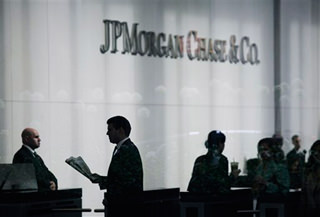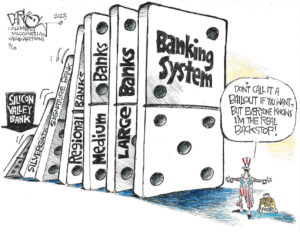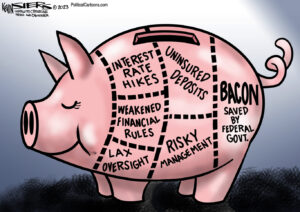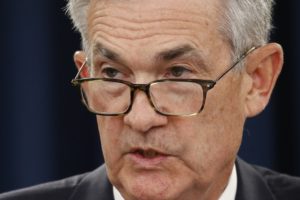Obama Can’t Knock the Hustle
How did we end up with such smart scoundrels? Even after it was known that Jamie Dimon's bank blew more than $2 billion, Barack Obama still had praise for the intellect of his political backer.Even after it was known that Jamie Dimon's bank blew more than $2 billion, Barack Obama still had praise for his political backer.
How did we end up with such smart scoundrels? Even after it was known that Jamie Dimon’s bank blew more than $2 billion on the same suspect derivatives trading that has bankrupted the world’s economy, Barack Obama still had praise for the intellect of his political backer and the integrity of the bank he heads: “JPMorgan is one of the best-managed banks there is,” the president told the hosts of ABC’s “The View” in an interview televised Tuesday, adding, “Jamie Dimon, the head of it, is one of the smartest bankers we got. And they still lost $2 billion and counting.”
A lesser bank would have gone under and needed to be bailed out, Obama argued: “That’s why Wall Street reform is so important.” But even when fully implemented, Obama’s tepid reforms would not have stopped this scam and will not stop the others that are sure to follow. Being one of the smartest bankers means you are among those who best know how to skirt the law or, if that cannot be done, how to successfully lobby to gut it.
Dimon understands and performs this drill well, for he was in cahoots with his mentor, Sandy Weill, in engineering a series of mergers and acquisitions that would have violated the Glass-Steagall law, which for decades had prohibited commingling investment and commercial banking. The two business executives were able to get Congress and President Bill Clinton to reverse Glass-Steagall, a change that made legal the creation of Citigroup, the too-big-to-fail bank that eventually was saved from bankruptcy only through an immense taxpayer bailout.
The best and the brightest in this case are the bane of the nation because their genius lies in outwitting all efforts to hold them accountable. Dimon, the most recent in a parade of now-disgraced Wall Street golden boys, was nonetheless just awarded $24 million in compensation for 2011 by JPMorgan. Like his mentor Weill, who ran Citigroup into derivative trading hell, Dimon will no doubt suffer little legal unpleasantness or social ostracism stemming from his dodgy behavior. Weill will soon be inducted into the American Academy of Arts & Sciences as an outstanding business leader and philanthropist.
The fact that Dimon first rose to banking prominence as he worked alongside Weill to reverse Glass-Steagall did nothing to tarnish his reputation in Obama’s eyes. Although Dimon was instrumental in establishing Citigroup, he had a falling out with Weill and left the bank before the great crash. In his subsequent reincarnation at JPMorgan, now the country’s biggest financial conglomerate, Dimon was a major supporter of Democrats and had more access to the president than any other Wall Street leader.
Dimon was not shy about turning to Obama, whom he had backed with campaign contributions, to complain about the Dodd-Frank regulations. With the JPMorgan CEO exercising his easy access to the president and his Treasury secretary, Tim Geithner, the new regulations concerning bank derivatives trading were rendered meaningless. What did Obama think would happen when he appointed Dimon’s chief Washington lobbyist, William Daley, who served as presidential chief of staff through 2011, when the Dodd-Frank regulations were being promulgated?
As an Associated Press investigative report documented, Dimon led the Wall Street pack in the number of personal meetings and telephone calls with Secretary Geithner while the Obama administration was calibrating its response to the banking meltdown. Dimon has been a Class A director of the New York Fed since 2007, when Geithner was president of that institution, and the two worked closely then on details of JPMorgan’s takeover of Bear Stearns with a $55 billion Fed loan. That’s in addition to the $25 billion in TARP funds JPMorgan received.
Dimon’s close ties to Obama, whom he knew well when both were based in Chicago, were at moments tested by Obama’s feints into populism, but fellow Chicagoans Daley and Rahm Emanuel, who preceded Daley as chief of staff, made it clear that disagreements between the White House and Dimon were merely rhetorical. How much more influence could Dimon have wanted than having his former lobbyist controlling the president’s schedule?
It was a charade: Dimon pretended to welcome some banking regulation and Obama responded with the weakest of reforms.
Crunch time came this past February when JPMorgan executives, including Ina Drew, the recently resigned head of the bank’s unit that was behind the billions in losses, met with Federal Reserve officials to secure guarantees that the portfolio trading that later got the company into trouble was in fact legal. That so-called portfolio hedging, which Sen. Carl Levin, D-Mich., said “is a license to do pretty much anything” and violates the intent of the law, has now in fact been accepted by both the Treasury Department and the Fed as legal. As a result, there is a regulatory loophole that Levin called “big enough … that a Mack truck could drive right through it.” Evidently one did.
Your support matters…Independent journalism is under threat and overshadowed by heavily funded mainstream media.
You can help level the playing field. Become a member.
Your tax-deductible contribution keeps us digging beneath the headlines to give you thought-provoking, investigative reporting and analysis that unearths what's really happening- without compromise.
Give today to support our courageous, independent journalists.




You need to be a supporter to comment.
There are currently no responses to this article.
Be the first to respond.